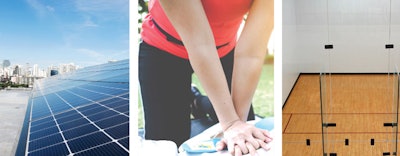
Learning never stops for campus recreation professionals. So it's no surprise that, as the end of the calendar year (and the midway point of the academic year) approaches, many NIRSA members will seek new and vital information to help them do their jobs even more effectively by attending the NIRSA Triventure Institute in San Diego, Nov. 6-8, and AB Show 2019 in Orlando, Fla., Nov. 13-16.
2020The first year the NIRSA Recreation Facilities Institute will be held in partnership with AB Show, in Baltimore, Md.
2018Year in which Athletic Business became NIRSA's Preferred Media Partner
1997Year Athletic Business became an associate member of NIRSA
1991The first year of the NIRSA Facilities Institute, held in Boston, Mass.
1982The first year of the annual event now known as AB Show, held in Chicago, Ill. |
Collectively, those two events offer more than 150 educational sessions designed to both educate and energize. Among them will be presentations about sustainable programming, risk-management issues related to student staffing, and designing for small spaces — all topics that should be on the radar of any campus recreation professional heading into 2020.
What follows is a primer on those three subjects.
Develop a 'sustainability passion'
The term "sustainability" has morphed from a buzzword into a mission on many college and university campuses.
"As leaders in campus recreation, it is our social responsibility to put sustainability at the forefront of what we do," says Courtney Copp, member services coordinator for the University of Arizona's campus recreation department, who along with Southern Illinois University director of recreational sports and services Corné Prozesky will present a session at AB Show titled "Play Greener: Increasing Sustainability Through Projects and Programming." "The key is finding sustainability practices that work for all of us."
That means making simple and continual adjustments, such as installing motion-sensor lighting in racquetball courts and other areas that only need illumination when in use, adding more recycling and trash receptacles made out of recycled materials (and labeled as such for all to see), and rethinking marketing strategies.
For example, instead of handing out flyers (many of which wind up discarded anyway), post that information in high-profile places around the facility and on various social media platforms. Similarly, rather than giving away water bottles that might go unused, reward students with a free fitness assessment or a one-time pass to a fitness class.
"That way, you're providing the resources you already have, not spending time and other resources on things people might not even use," says Copp, who works in the first campus recreation facility in the country to be certified LEED Platinum, back in 2010. "Even if you think you've already done everything, there's always something else you can do. Developing a sustainability passion in your own department can make a big difference."
Train for a 'commonsense mindset'
Because students comprise the majority of staff members in a campus recreation facility, it's critical to train them to better assess, mitigate and respond to risks and emergency situations.
In the AB Show session "Developing Students Through Risk Management Training," Sarah Hardin, associate director of campus recreation at DePaul University, and Scott Vandermoon, DePaul's associate director of facilities, will share ideas about developing risk management strategies and trainings in various settings for student staff members.
"We're trying to prepare our students for whatever may occur," Hardin says. "We also should be teaching them protocol for multiple incidents that might happen at the same time, to make them aware of all sorts of possibilities."
As an example, Hardin cites a hypothetical situation in which staff members are responding to a tornado warning and striving to keep patrons safe when the anxiety triggers a cardiac emergency in someone.
"You're in the middle of something, and now you have to deal with a new situation," she says. "How do you make sure your staff is ready for that?"
One way is by implementing small-group discussions during regular staff meetings with students in which multiple scenarios like the tornado/cardiac arrest situation are presented. Students then respond with how they would react during such an incident. At DePaul, student staff members also are asked to share real-world situations that took place during the course of their shifts and what they learned from those experiences.
"It's not just a one-time thing for us," Hardin says. "It's more about making it a process throughout the time our student employees are with us and helping them plan for certain scenarios ahead of time. We want them to have a commonsense mindset and think about what they are doing, rather than simply react."
No amount of preparedness, however, can predict if, when and how an active-shooter situation might occur at a campus rec center. That is the ultimate example, Hardin says, of how teaching students to react to unexpected situations with logic and resourcefulness could potentially save lives.
Reimagine 'every nook and cranny'
As campus recreation professionals seek to convert underutilized (or even unused) racquetball courts to more active spaces, they're sometimes finding out that the 800-square-foot areas can be difficult to repurpose.
In her NIRSA Triventure Institute presentation — titled "What Can You Do With 800 Square Feet?" — Anita Moran, owner of the Office of Moran Architects in Dallas, will provide ideas for how to incorporate smart design into reimagined small spaces. Chief among those spaces are racquetball courts, which became an integral component of the campus recreation facility building boom in the early 2000s.
Nearly two decades on, the 40-feet-long-by-20-feet-high spaces present structural challenges, and their mechanical systems often are designed for a capacity of two to four people rather than 24 people in a group exercise class. Still, options exist without requiring the insertion of a second floor, Moran says, adding that it's possible to leverage that height.
Consider creating an esports venue, in which the additional vertical space will provide ample room for multiple large video screens and mezzanine viewing. Other options for seldom-used racquetball courts include building a demonstration kitchen, adding a mind-body studio or bringing in temporary synthetic turf for training purposes.
Racquetball courts aren't the only dead spaces that can be repurposed, though.
"Look at what cruise ships do with tiny spaces," Moran says. "Every square foot counts, because construction and operation is expensive, and the crew is looking to entertain a wide variety of people. Recreation professionals, now more than ever, are looking for ways to reenergize their centers at very little cost. Go through your facility and look at every nook and cranny to imagine what kind of programming might work in underused spaces."
She even suggests introducing a fresh set of eyes in the form of a programming person at another college or university who can provide additional insight.
While there are many important issues facing campus recreation professionals heading into 2020, preparing to meet the challenges they present head-on — as these AB Show and NIRSA Triventure Institute presenters emphasize — can help jumpstart another successful year.
NIRSA's Facilities Institute is joining AB Show 2020Athletic Business and NIRSA recently announced that the 2020 NIRSA Recreation Facilities Institute, sponsored by Mondo, and AB Show 2020 are teaming up in Baltimore, November 3–6, 2020. |
This article originally appeared in the November | December 2019 issue of Athletic Business with the title "Three issues campus rec professionals should have on their 2020 radar ." Athletic Business is a free magazine for professionals in the athletic, fitness and recreation industry. Click here to subscribe.





































